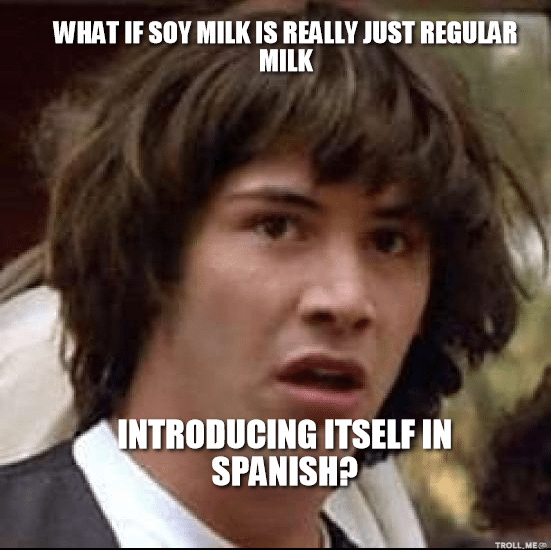MISSION DISTRICT, SAN FRANCISCO—A new age is upon us, the Age of Soy.
No, I’m not talking about some new genetically-modified organism that will (further) fundamentally alter the corn in our tacos, the gas in our cars or the farmland of the Midwest.
The development of which I speak has to do with how Mountain View, California-based Google’s launch of .SOY, a web domain targeting the country’s Latinos, was supposed to herald a new day on the Latino web, with some “Hispanic marketing experts” waxing triumphant about our (finally) getting some respect from a company that has a less-than-triumphant record of hiring Latinos or black people.
And then the Latino and vegan web responded: Hey Google, “soy,” (Spanish for “I am”) sounds more like a domain name for one of the tony vegan Mexican restaurants that Google and other Silicon Valley workers eat $15 tacos at than it does a hub for online Latinos.
Far from being the Latino web sensation Google and its “experts” expected, .SOY provides fodder for the amateur comedian in us all, with Latinos and vegans joining forces, taking the “.SOY” domain and applying it to different adjectives like quépendejo.soy (how stupid I am), #soyhispandering or calling .SOY “The must-have domain for the lactose-intolerant.”
And you would think a search company such as Google would have known more about a meme and all its variations making the online rounds for a few years now:
Apparently not.
Beyond raising the indelicate question (When will Google launch the .IAMWHITE domain?), Google’s latest move raises a more important question: How can a company based in parts of the United States where the overwhelming majority of the country’s 50 million Latinos live, be so border-walled off from the physical, geographic and cultural reality just outside its gates, so self-absorbed in the virtual world where it is king? Another equally pointed question has to do with us, specifically with where and how Latinos relate to the Digital Darwinism that is (again) shuffling and redefining the social and economic positions of Latinos and us all.
In searching for an answer, there’s no better place to find it than here in the Bay Area birthplace of the digital economy. Whether in the area around Twitter headquarters, in the biotech labs surrounding the soon-to-be World Champion (again!) Giants’ stadium or in the former farmlands where I saw Latino farm workers harvesting fruits and vegetables pushed out by mostly non-Latino workers and companies harvesting the new crop (enormous wealth and astonishing class divisions), the genetically-modifying ethic and the spirit in Google’s .SOY capitalism is clear: We will define you for you—if you let us.
Protests by anti-gentrifying forces against private (as in gated off from everybody else) Google buses on 24th and Valencia in the Mission district say as much about Google and renters, Google and working people and Google and Latinos as they do about the we-won’t-let-you dignity of communities struggling not to be erased or forgotten in the Great Digital Transition that Google, The Most Valuable Company on Earth, leads behind the “don’t be evil” slogan. Four blocks from 24th, I saw those same race and class dynamics in the successful fight of soccer-playing Latino youth against Dropbox employees to win back a soccer field just behind my grandmother’s former home on 20th street. Unlike my abuela, who rented at reasonable rates to immigrants, landlords on 24th and on 20th and throughout the formerly working class neighborhoods of the Bay Area joined Google and other tech companies in the long march of digital progress that has brought us the $3000-a-month bedroom rental in the Mission.
As an alumni, I was especially saddened to see how this same Darwinian instinct created a UC Berkeley (UCB) where Latino and black enrollments have diminished to the point where the university no longer ranks among the top 50 Latino-friendly universities in the country. Especially gross and dangerous are comparisons of low working-class Latino enrollments and high middle-class Asia-Pacific Islander enrollments at UCB that are explained in the most subtle, survival-of-the-fittest undertones over cappuccinos in cafes that once housed Black and Brown Panther meetings and “Third World Solidarity” organizing meetings (digitally driven rents make revolution exponentially more difficult).
Google’s faux pas has its political equivalent in the patently false notion that immigration or other Latino issues were ever part of some nonexistent “progressive” community in rapidly non-working class San Francisco and other cities. Such perceptions, exploited by Democrats, are equivalent to Mission District Día De Los Muertos celebrations largely devoid of Latinos as well as to upscale Mexican restaurants where Mexicans work, but can’t eat at because they don’t earn enough in working at the upscale Mexican restaurant.
It is within such an actually existing cultural context that .SOY is born and may (or may not) thrive. The good news is that many of us are waking up. Here in the Mission, we saw this self-determination in the win against Dropbox. On the national playing field, we see it in the devastation wrought on the Democrat-Republican Washington consensus on immigration—legalizing four out of 11 million people in exchange for even more border militarization, more laws punishing tens of millions of immigrants under cover of “comprehensive immigration reform” proposals. We know that self-respect leads us to take the action of non-participation in anti-democratic processes not of our own making or without our consent or consultation.
Had they looked beyond the gated walls of their headquarters or outside the plastic borders of their imperial computer screens, Google’s chieftains might have realized that the energy and money spent on creating the solipsistic self-absorption inherent in .SOY would have been better placed in a more community-oriented approach of something like .SOMOS, which means WE ARE.
***
Roberto Lovato is a writer and a Visiting Scholar at UC Berkeley’s Center for Latino Policy Research. You can follow Roberto on Twitter @robvato.





[…] A new age is upon us, the Age of Soy.No, I’m not talking about some new genetically-modified organism that will (further) fundamentally alter the corn in our tacos, the gas in our cars or the farmland of the Midwest.The development of which I speak has to do with how Mountain View, California-based Google’s launch of .SOY, a web domain targeting the country’s Latinos, was supposed to herald a new day on the Latino web, with some “Hispanic marketing experts” waxing triumphant about our (finally) getting some respect from a company that has a less-than-triumphant record of hiring Latinos or black people.And then the Latino and vegan web responded: Hey Google, “soy,” (Spanish for “I am”) sounds more like a domain name for one of the tony vegan Mexican restaurants that Google and other Silicon Valley workers eat $15 tacos at than it does a hub for online Latinos.Far from being the Latino web sensation Google and its “experts” expected, .SOY provides fodder for the amateur comedian in us all, with Latinos and vegans joining forces, taking the “.SOY” domain and applying it to different adjectives like quépendejo.soy (how stupid I am), #soyhispandering or calling .SOY “The must-have domain for the lactose-intolerant.”And you would think a search company such as Google would have known more about a meme and all its variations making the online rounds for a few years now:Apparently not.Click headline to read more and watch video clip– […]
[…] Source: https://www.latinorebels.com […]
[…] Guest Contributor Roberto Lovato, originally published at Latino […]